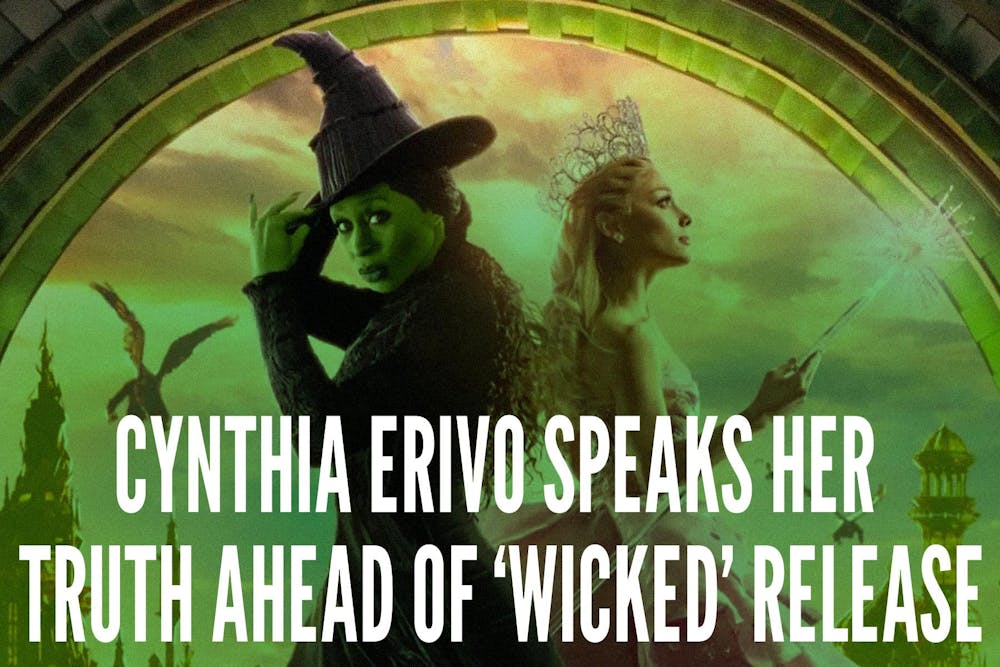“The most disrespected person in America is the Black woman,” Malcolm X said in a 1962 speech in Los Angeles on the tribulations of Black women in America. “The most unprotected person in America is the Black woman. The most neglected person in America is the Black woman.”
Arguably one of the most recent victims of this notion is Cynthia Erivo, the Emmy award-winning co-star of the highly anticipated film “Wicked” (to be released Nov. 22). “Wicked,” a film inspired by the 2003 Broadway hit, adapted from the 1995 novel, recounts the story of the Wicked Witch of the West from the “Wizard of Oz” in a different light than the classic telling.
Erivo plays that witch, Elphaba, alongside Ariana Grande, who has been cast as Glinda, “the good witch.” Promotion for the film has been compared to that of Barbenheimer, with numerous marketing efforts and brand partnerships including Béis, Mattel and Conair to name a few. “Glicked”, the combined released of “Gladiator II” and “Wicked,” is projected to revive the lackluster fall box office.
But arguably the most attention has been garnered from Erivo’s fiery response to fan art. For context, the original image promoting the “Wicked” musical depicts both witches, Elphaba with her eyes covered and Glinda whispering in her ear. The poster for the film recreated this iconic photo but with Erivo staring down the barrel of the camera and more of Grande’s face being displayed.
One fan, who goes by the X handle “midsommar,” edited the new poster to better resemble the original. The edit went viral, garnering 7.4 million views and attention from Erivo herself, who took immediate offense. She furiously took to Instagram: “Our poster is an homage not an imitation, to edit my face & hide my eyes is to erase me. That is just deeply hurtful,” Erivo wrote on her story.
Many people saw this as an overreaction. However, in an interview with Entertainment Tonight, Erivo said, “I’m passionate about it and I know the fans are passionate about it and I think for me it was just like a human moment of wanting to protect little Elphaba, and it was like a human moment. I probably should have called my friends, but it’s fine.”
While the fan most likely meant no harm, I would argue that this is yet another perpetuation of the erasure of Black women in history and entertainment. Black women have historically been diminished and erased, their contributions silenced under the yells of their counterparts.
Zora Neale Hurston, an African American writer during the Harlem Renaissance, was often silenced by other Black authors. “Mule Bone”, a play written by Hurston and Langston Hughes, sparked controversy over authorship that was never mitigated.
15-year-old Claudette Colvin, a dark-skinned woman, was the first person to refuse to give her seat up on a bus and was arrested on March 2, 1955 — nine months before Rosa Parks.
The three organizers of #BlackLivesMatter are Black women: Patrisse Cullors, Alicia Garza and Ayo Tometi. The organization came to fruition following the murder of Trayvon Martin. They established 13 “guiding principles,” one of which was ensuring Black women were a priority and their voices were heard. However, their names are not well known, nor are the principles addressed, if at all, in today’s society.
The #metoo movement was started by Tarana Burke, a Black woman. However, the movement blew up in 2017 when actress Alyssa Milano tweeted it without crediting Burke, encouraging women to share their sexual abuse stories.
Beyoncé, the most decorated Grammy artist of all time, has yet to win Album of the Year — most recently losing to a white male, Harry Styles. Just three Black women have won AOTY in the 65-years the Grammys have been around.
From Hurston to Beyoncé to Erivo, Black women have been the subject of subjugation and appropriation in the media. Cynthia Erivo’s controversy is yet another example of a tale as old as time: a Black woman being silenced and erased, this time, physically. What may seem like harmless fanart actually possesses the power of erasure. So despite what the internet may think, it is, indeed, that deep.










